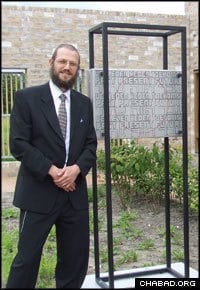After a grand-opening ceremony attended by the Netherlands’ Princess Margriet, Europe’s only Jewish communally-run psychiatric hospital is expanding its operations in the city of Amstelveen.
From a total of three locations – the Sinai Centrum Psychiatric Hospital also operates from Amsterdam and Amersfoort – serves a population needing a full host of residential services and outpatient treatments. Its chief rabbi, Rabbi Binyomin Jacobs – who also directs Chabad-Lubavitch of the Netherlands – supervises a staff whose mission is to infuse the spiritual identity of the center with a grounding in Judaism.
Through such efforts, not only are all patients guaranteed kosher food and religious services, but in many cases, explains Chabad-Lubavitch Rabbi Daniel van Praag, the spiritual component strengthens the efficacy of patients’ treatment.
For instance, relates van Praag, the Sinai Center’s head chaplain, one patient at another psychiatric hospital was admitted with severe depression following the passing of her husband. She refused to eat, and the staff at the other hospital were contemplating honoring the patient’s decision to die.
Van Praag had the woman transferred to the Sinai Center, where staff were able to convince her to finally eat. The treatment for her depression continued, and she was eventually discharged.
“She leads more or less a regular life now,” says the rabbi.

Royal Candle-Lighting
At the opening ceremony, which took place in the synagogue of the new center in Amstelveen, the princess lit a candle, which her mother, Queen Juliana, did 40 years earlier at the grand opening of another of the Sinai Center’s buildings. The royal presence underscored the high regard the Netherlands holds for the hospital, which was established in 1960 at the site of the Apeldoornsche Bos hospital – where during World War II, Nazi forces took some 1,200 patients and staff to be gassed at Auschwitz – to treat traumatized Holocaust survivors. Since then, the Sinai Center has expanded its focus to care for all members of the Jewish community, and many non-Jewish patients as well.
“A lot of second-generation Holocaust survivors, people who were brought up with parents in the war, really suffer,” says van Praag, referring to one subset of patients seen by the Sinai Center.
Each week, eight volunteers from the surrounding Jewish community come to each of the hospital’s facilities to run Shabbat programming. They help female patients light Shabbat candles, make kiddush, lead services and host a concluding ceremony on Saturday night.
“The patients who live with us frequently have a minimal level of function,” says van Praag. “So we make blessings together with them. Often, we’ll start the blessing, and they’ll know how to finish.”
A learn and work center established by hospital offers some patients employment opportunities. People who work at the center produce necklaces, Chanukah candles and Shabbat candles. In addition, a bakery staffed by professionals and patients produces kosher baked goods for the hospital and stores throughout the country.
Many patients’ families attend holiday parties at the Sinai Center, but in a vast number of cases, staff members must become surrogate families of sorts for the people in their care. A large percentage of the Holocaust survivors don’t have any family of their own, and for the patients who come from locations outside of the Netherlands, the distance proves a formidable obstacle for families.
“Some parents bring a child with special needs here and are not able to come all that often to visit,” says van Praag. “So we become part of their family.”
In one case, staff at the Sinai Center helped keep a family together. When a young pregnant woman with depression was admitted following the abandonment of her husband, she wanted to have an abortion. Medical and psychological staff chose to treat the depression first and counseled the woman through her pregnancy. In the end, she had the baby and the husband returned. The couple have since had another child together.
“They are a beautiful family now,” says van Praag.
While some patients come from around Europe, insurance rules outside of the Netherlands prevent others from going abroad for their care. Jacobs, who was recently chosen to head the Dutch Rabbinate, is working on a solution to the insurance problem.
Says van Praag: “We want to truly be a center for all of Europe.”




Join the Discussion